Worldwide fight against climate change should not come at the sacrifice of justice
During the Group of 20 (G20) Leaders’ Summit in Rome and the 26th United Nations Conference of the Parties on Climate Change (COP26) in Glasgow, the UK, leaders of certain developed countries attempted to shirk their countries’ responsibilities for ensuring the future of the Earth. Such ignorance of the concept of differentiated responsibilities and the varied abilities of countries in fulfilling their obligations is not only unfair and unreasonable, but also does no good to achieving the common goal of containing climate change.
As a matter of fact, developed countries are the ones who are more responsible for the accumulative production and transfer of greenhouse gas emissions.
Developed countries are responsible for the historical buildup of carbon dioxide emissions. Carbon dioxide can linger in the atmosphere for several hundreds of years, which means that greenhouse gases released centuries ago are still the main cause of climate change even up to this day. A report by CNN pointed out that China’s carbon dioxide emissions started to increase starting at the beginning of this century, though by that time developed countries had already been a source of carbon emissions for nearly 200 years since the industrialization process emerged.
Statistics by Carbon Brief, a British energy research institute, showed that the US has released more than 509 billion tonnes of carbon dioxide since 1850, twice as much as that released by China. A report by Rhodium Group, an independent research provider, indicated that the per capita carbon dioxide emissions emitted by the US were nearly twice that of China. Climate Transparency, an open global consortium under the United Nations Framework Convention on Climate Change (UNFCCC), said in a 2021 report that this was partly because of differences between each country’s respective lifestyles. The Americans took more car journeys, and their per capita flight data was also higher than that of the Chinese, the report pointed out.
Carbon dioxide emission transfers between countries should never be overlooked. In recent decades, exports from developing countries, which remain at the bottom of the industrial chain, embodied significant volumes of emissions, enabling citizens in developed countries to live a cozy and comfortable life without appreciating the impact their consumption habits have on the wider world. According to estimates by scholars, including Keiichiro Kanemoto, associate professor of the Research Institute for Humanity and Nature in Japan, among China’s carbon emissions in 2015, some 580 million tonnes were embodied in goods exported to the US, 530 million tonnes were embodied in goods exported to Europe and 240 million tonnes were embodied in goods exported to Japan. It’s fair to say that a large proportion of carbon emissions from China and other developing countries were embodied in exports to developed countries.
The development gap between high-income countries and low-income ones should also be taken into consideration when talking about equality in climate change. Sonja Klinsky, an associate professor at Arizona State University in the US, wrote in an article that as a country’s emissions get higher, the country gets less tied to essentials for human well-being. That means high-emitting, high-income countries could reduce their emissions significantly without reducing the well-being of their populations, while lower-income, lower-emitting countries cannot.
Chinese Ambassador to the US Qin Gang recently used a cartoon to vividly illustrate how unfair and absurd it is to let developing and developed countries shoulder equal responsibilities in addressing climate change. In the cartoon, a lanky man in ragged clothes is cooking over firewood. A person driving an oversized luxury vehicle points to him and says, “Hey you, you are destroying the environment.” An internet user with the account name of Ubong Essien commented: “Developed countries are so unreasonable. They stole our resources and hindered our development. Now, they blame us for climate change. Please give our gold, mineral products and oil back to us before asking us to shoulder equal responsibilities.”

Photo shows a cartoon used by Chinese Ambassador to the US Qin Gang at a meeting on climate change. (Photo from Weibo)
Low-income countries have inadequate funds and lack the proper technological means to deal with climate change. Developed nations have pledged that they would deliver $100 billion a year to help lower-income nations in their response to climate change. However, they have yet to honor the commitment.
Countries around the world should join hands in coping with climate change by shouldering their common but differentiated responsibilities. As the largest developing country in the world, China has made a clear commitment to cut carbon emissions. This low-carbon commitment requires China to make the transition from reaching its carbon peak to realizing carbon neutrality within 30 years, which compares to a 40-to-70-year timeframe taken by most developed countries. China always honors it commitments by taking concrete actions. Developed countries should also demonstrate their capability and determination in honoring commitments, instead of just paying lip service and shifting blame to other countries.
Photos
Related Stories
- Hypocrisy in some rich nations’ climate policies
- China takes concrete actions towards tackling climate change
- Why China's climate change dedication credible and attainable
- China contributes to global carbon emissions reduction
- All lip service, no actions -- Developed countries urged to walk the talk on climate crisis
- A divided America casts a shadow on global response to climate change
Copyright © 2021 People's Daily Online. All Rights Reserved.










